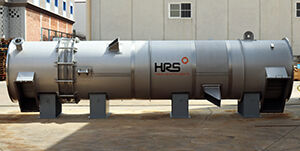ABLE INSTRUMENTS RECOMMENDS RF ADMITTANCE WITH COATING REJECTION FOR CHALLENGING LEVEL APPLICATION

In Bitumen production, the journey from crude to highly refined process oil starts in the distillation column. The crude oil is pumped from storage tanks through a heat exchanger system where its temperature is increased to about 200°C – and then further heated in a furnace to around 300°C where it is partly vaporised before entering an Atmospheric Distillation Column (ADC).
In the ADC the physical separation of the components takes place. The lighter components rise to the top and the heaviest components fall to the bottom of the column. The material from the bottom then enters a Vacuum Distillation Column via another heat exchanger. This is where the bitumen is produced. Vacuum distillation helps to maintain the inherently high binding characteristics of crude due to the lower operating temperatures.
As an established supplier of process control instrumentation to the Bitumen industry, ABLE recommend the Drexelbrook IntelliPoint RF Admittance Point Switch for the critical high level alarm duties on the bitumen storage tanks. Spillages from these bitumen storage tanks as a result of overfilling have a high potential for serious injury, as bitumen is stored at high temperatures and has a large thermal capacity. Furthermore, the coating rejection capability of the IntelliPoint is key to the success of the measurement of this highly viscous medium. The subsequent reliable and repeatable performance of the IntelliPoint has allowed several Bitumen producers to raise the high alarm level set-point, thereby increasing the storage inventory of the vessels.
A Senior Maintenance & Project Engineer from a major Bitumen plant in northeast England, commented “We had been having a lot of issues with unreliable High level probes for some time and after some research and preliminary testing decided to use the Drexelbrook model RMT2 probes from ABLE. Along with the in house designed electrical panels we now have a more reliable probe with indication and controlled stop operations fed to/from the DCS that can be relied upon. We will be purchasing further units for our production vessels and chemical tanks in the near future.”
From April through to the end of September, the UK’s road resurfacing industry’s demands for Bitumen and its by-products soars as weather conditions become most suitable for the application of tarmac and emulsion. The plant in question’s core business is making bitumen emulsion and hot bitumen that has been modified either with polymers or oil to make harder wearing flexible products to satisfy specific requirements that are over and above straightforward bitumen. To capitalise on the changes taking place in the market and optimise its production assets, the plant went over to 24/7 production July 2007.





